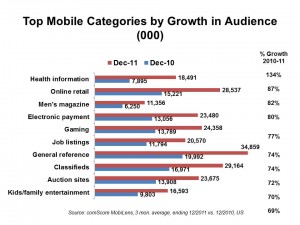 comScore has issued its annual report on the state of the American digital consumer in U.S. Digital Future in Focus 2012 and the topline is that mobile and Facebook are redefining communication in both the digital and physical worlds.
comScore has issued its annual report on the state of the American digital consumer in U.S. Digital Future in Focus 2012 and the topline is that mobile and Facebook are redefining communication in both the digital and physical worlds.
This disruptive phenomenon has transformational implications for health and health care.
comScore’s macro observations are that:
– Social networking, and especially Facebook, is capturing a growing proportion of online users’ time, thus redefining how brands and organizations must interact with customers offline and on-.
– Google remains the search leader but Bing has grown, surpassing Yahoo! as #2 in 2011.
– Online video streaming substantially grew in 2011, shifting Americans’ viewing behavior away from other platforms.
– 2011 witnessed a major shift in advertising dollars to digital media, forcing advertisers to better integrate content and messaging across ad ecosystem platforms. The top 10 advertisers online by number of impressions were AT&T, Experian, Verizon, Scottrade, Google, Microsoft, Netflix, eBay, Progressive (insurance), and IAG.
Finally, comScore introduces the consumer market segment that’s on multi-platforms consuming eversomuch more content — the Digital Omnivore (DOs).
DOs are consumers who access content through several touch points during the day, comScore says — via mobile devices like tablets and phones, computer monitors, TVs, radios. Look to mobile (esp. phones) as not primarily communication devices, but “content consumption tools,” comScore notes.
Health Populi’s Hot Points: The fastest-growing mobile category by growth in audience was health information — which grew by 134% between December 2010 and December 2011, to 18 million people. While the health segment isn’t the largest mobile category — that title goes to general reference, classified ads, online retail, and gaming — health information holds a respectable place amidst these bigger segments, contradicting cynics who don’t believe people want to engage in health via mobile phones.
comScore comments that, “Health information has continued to gain popularity among mobile users…this emergent category amassed a growing and significant audience base. With more mobile health startups entering the field and traditional health information providers improving their mobile strategies, look for 2012 to see this area develop further.”
In the past month, Kaiser Permanente launched an app to enable patients to access their personal health records via mobile — an indication that this provider, among the most mature and sophisticated health information infrastructures in the U.S., has entered the #mhealth ecosystem. Watch for more health plans and providers to join Kaiser to meet health consumers where they live and work.
Beyond health information seeking, Digital Omnivores will meet up with Quantified Self-ers to integrate daily health activities on mobile platforms through self-monitoring and reminding for medication adherence, glucose testing, and other daily health behaviors.




 I'm in amazing company here with other #digitalhealth innovators, thinkers and doers. Thank you to Cristian Cortez Fernandez and Zallud for this recognition; I'm grateful.
I'm in amazing company here with other #digitalhealth innovators, thinkers and doers. Thank you to Cristian Cortez Fernandez and Zallud for this recognition; I'm grateful. Jane was named as a member of the AHIP 2024 Advisory Board, joining some valued colleagues to prepare for the challenges and opportunities facing health plans, systems, and other industry stakeholders.
Jane was named as a member of the AHIP 2024 Advisory Board, joining some valued colleagues to prepare for the challenges and opportunities facing health plans, systems, and other industry stakeholders.  Join Jane at AHIP's annual meeting in Las Vegas: I'll be speaking, moderating a panel, and providing thought leadership on health consumers and bolstering equity, empowerment, and self-care.
Join Jane at AHIP's annual meeting in Las Vegas: I'll be speaking, moderating a panel, and providing thought leadership on health consumers and bolstering equity, empowerment, and self-care.